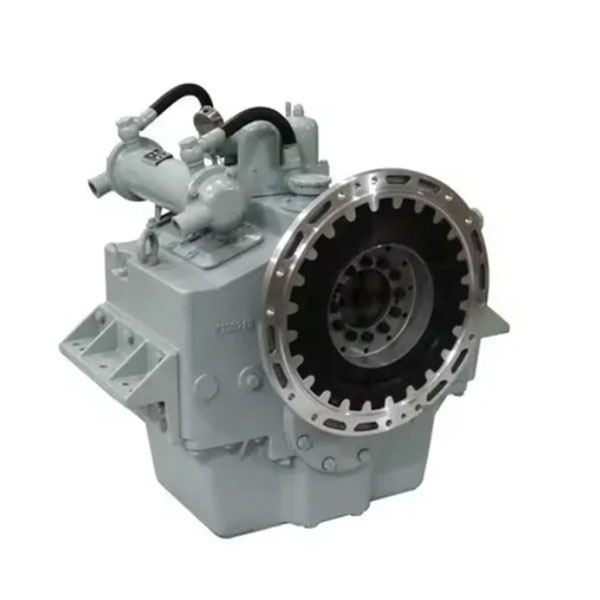Why Is the Marine Propulsion System-Gearbox So Crucial for Modern Vessels?
2025-10-21
When it comes to marine engineering, efficiency and reliability are two of the most important aspects determining the performance of any vessel. The Marine Propulsion System-Gearbox plays a pivotal role in converting the engine's power into controlled thrust, enabling ships and boats to move smoothly and efficiently through water. As a professional in the marine transmission industry, I have witnessed how the right gearbox design can dramatically enhance the operational lifespan, reduce fuel consumption, and ensure stable navigation under various sea conditions.
Understanding the Marine Propulsion System-Gearbox
A Marine Propulsion System-Gearbox is a mechanical transmission device designed to transfer the rotational energy from the ship's engine to the propeller shaft. It precisely adjusts the rotational speed and torque to optimize propulsion efficiency. In other words, it ensures that the power produced by the engine is effectively utilized for movement — with minimal energy loss.
Key Parameters of a Marine Propulsion System-Gearbox
| Parameter | Specification | Description |
|---|---|---|
| Gear Ratio | 1.5:1 – 5:1 | Adjusts torque and speed for different vessel sizes |
| Power Range | 50 HP – 2500 HP | Suitable for small fishing boats to large commercial ships |
| Input Speed | 1000–1800 RPM | Matches marine diesel engine standards |
| Lubrication System | Forced oil circulation | Ensures continuous cooling and smooth operation |
| Material | High-strength alloy steel | Increases durability and corrosion resistance |
| Noise Level | ≤85 dB | Designed for quiet and stable operation |
At Hangzhou Cagon Transmission Technology Co., Ltd., our gearboxes are designed with precision machining technology and high-grade materials to guarantee superior performance under harsh marine environments.
What Is the Main Function of a Marine Propulsion System-Gearbox?
The primary function of this gearbox is to transmit power efficiently from the engine to the propeller while managing torque and speed ratios. Additionally, it supports directional control — enabling forward and reverse motion — and acts as a protective mechanism against engine overload.
To put it simply, without a well-calibrated gearbox, even the most powerful engine cannot propel a vessel efficiently.
How Does the Marine Propulsion System-Gearbox Improve Performance?
A high-quality gearbox directly influences the fuel efficiency, propulsion smoothness, and maneuverability of a vessel. When I first worked on a ship maintenance project, I noticed that replacing an outdated gearbox with a new Marine Propulsion System-Gearbox from Hangzhou Cagon improved fuel efficiency by nearly 12%.
Performance Benefits:
-
Stable torque output and reduced vibration
-
Longer service life due to optimized gear surface hardness
-
Improved heat dissipation through advanced lubrication systems
-
Reduced maintenance downtime and cost
These improvements make modern marine vessels more sustainable and reliable for long-distance operations.
Why Is the Marine Propulsion System-Gearbox So Important in Maritime Engineering?
The importance lies in its role as the mechanical heart of propulsion. Without it, energy from the engine cannot be efficiently transferred to movement. Moreover, a gearbox helps control noise, reduce mechanical wear, and maintain consistent speed across variable load conditions.
Importance Summary:
-
Guarantees operational stability in rough seas
-
Prevents overload damage to engines and propellers
-
Enhances maneuverability during docking or reversing
-
Contributes to environmental compliance by improving fuel efficiency
For shipowners and operators, investing in a reliable gearbox means fewer breakdowns, better efficiency, and improved overall vessel performance.
Q1: What Makes a Marine Propulsion System-Gearbox Different from a Standard Gearbox?
A1: Unlike industrial gearboxes, a Marine Propulsion System-Gearbox is designed to withstand high moisture, corrosion, and vibration levels. It also features specific torque ratios and reverse mechanisms tailored for marine environments.
Q2: How Often Should a Marine Propulsion System-Gearbox Be Serviced?
A2: In my experience, I recommend a full inspection every 1000 operating hours. Regular oil analysis, gear surface checks, and seal replacements ensure long-term performance and safety.
Q3: Why Should I Choose Hangzhou Cagon Transmission Technology Co., Ltd. for My Marine Propulsion System-Gearbox?
A3: I personally trust Hangzhou Cagon because their gearboxes are engineered using precision grinding and heat treatment processes that ensure maximum efficiency and durability. The company provides customized gearbox solutions for different vessel types — from fishing boats to large cargo ships.
Applications
The Marine Propulsion System-Gearbox is widely used across:
-
Fishing boats and patrol vessels
-
Cargo ships and passenger ferries
-
Offshore supply vessels
-
Pleasure crafts and yachts
Each application requires specific torque handling and speed reduction, and Hangzhou Cagon's engineering team tailors each gearbox model accordingly.
Conclusion
A Marine Propulsion System-Gearbox is far more than a mechanical component — it is the core of marine power transmission, directly impacting vessel performance, safety, and operational economy. Whether you are upgrading an existing system or designing a new vessel, choosing the right gearbox will determine your success at sea.
At Hangzhou Cagon Transmission Technology Co., Ltd., we combine advanced engineering, precision manufacturing, and rigorous testing to deliver world-class marine gearboxes that ensure your vessel runs smoothly and efficiently.
📩 For inquiries, technical support, or customized solutions, please contact us today — let's power your marine journey with reliable propulsion technology!


